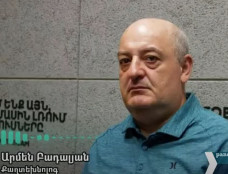
Maidan violence investigations fail European human rights standards: International Advisory Panel presents its review in Kyiv
The report of the International Advisory Panel on its review of the investigations into the violent incidents during the Maidan demonstration was published and presented in Kyiv on March 31, the Council of Europe said in a press release.
The International Advisory Panel was constituted by the Secretary General of the Council of Europe to oversee that the investigations, into the violent incidents which took place during the Maidan demonstrations from 30 November 2013 to 21 February 2014, met all the requirements of the European Convention on Human Rights and the case-law of the European Court.
The Panel has found that, in many respects, the investigations have failed to satisfy the requirements of the European Convention of Human Rights.
Prior to 22 February 2014, during the three months of the demonstrations, “there was no genuine attempt to pursue investigations.” This, the Panel found, “inevitably meant that the investigations did not begin promptly, and this constituted, in itself, a substantial challenge for the investigations which took place thereafter.”
After 22 February 2014, the Panel acknowledged that the investigations faced significant challenges, which, however, “cannot excuse any failings which did not inevitably flow from them.” The authorities of the present government clearly were, and are under, an obligation to take all reasonable steps to ensure that the investigations comply with Article 2 (Right to life) and Article 3 (Prohibition of torture) of the Convention.
The Panel considered that the investigations lacked practical independence. The investigations were also ineffective or a number of reasons: the resources of the Prosecutor’s General Office (PGO) allocated to the Maidan investigations were “wholly inadequate”; there was a lack of continuity in the leadership of the PGO investigations and the allocation of investigative work was inefficient. Moreover, the unco-operative attitude on the part of the Ministry of Interior and of the State Security Service of Ukraine had a negative impact on the investigation. The Panel cites the example of the investigation of the alleged involvement of Berkut officers as illustrating a lack of co-operation and obstruction by the Ministry of Interior, “which seriously impeded progress in this key investigation.”
The Panel also found that the decisions of the Pecherskyi District Court failed to comply with the requirements of the European Convention; it advised against the granting of amnesties or pardons to law enforcement officers in relation to unlawful killings or ill-treatment, and concluded that a coordinated communication policy should have been, but was not, put in place to ensure adequate public scrutiny of the investigation.
The Panel concluded that, as a result of these investigative deficiencies, substantial progress had not been made in the Maidan investigations.
See the Panel’s detailed conclusions here.
Newsfeed
Videos






























